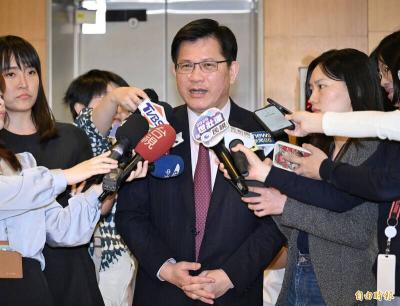The Referendum Review Committee is set to deliver a verdict tomorrow on the validity of a referendum question asking voters whether they agree with the government's plans to sign an economic cooperation framework agreement (ECFA) with China.
Opposition parties, including the Democratic Progressive Party (DPP) and the Taiwan Solidarity Union (TSU), have rallied behind the question, saying that a public vote is essential before President Ma Ying-jeou's (馬英九) administration can move forward on the controversial trade agreement.
A number of senior government officials, however, have said that the referendum is unnecessary as an ECFA would have to be ratified by the legislature before it becomes valid. The proposed pact could be signed this month.
They added that the committee should turn down the proposal because it did not fit the criteria of the Referendum Act (公民投票法).
Speaking at a public hearing on Friday, Mainland Affairs Council Deputy Minister Chao Chien-min (趙建民) said that an ECFA was an economic agreement touching on taxation and tariff issues — which under the act cannot be subject to a public vote.
At a press conference yesterday, the TSU called on the committee to deliver the verdict in an impartial manner and raised concerns about government interference affecting the final decision.
A similar proposal by the DPP was rejected by the committee last year after it ruled that the referendum question was based on a hypothetical situation that did not meet the Referendum Act’s criteria.
“The Taiwanese government has for the past year been pushing for this ECFA with China as an important national policy. Despite multiple negotiations, the government still has not disclosed the content of the agreement,” TSU Chairman Huang Kun-huei (黃昆輝) said.
“This has created many unanswered questions for the public. Under the circumstances, we think that only through a referendum can we resolve this deeply controversial issue,” he said.
Huang said that the president has repeatedly called the proposed ECFA “a piece of national policy,” which would qualify it for a plebiscite under Section 2 of the Referendum Act.
Former vice president Annette Lu (呂秀蓮) said that if an ECFA were to be signed and became valid without first holding a public vote, “it would be an offense against democracy.”
“The [committee] cannot take away the people's basic rights to decide on such an important piece of national policy. It should not be signed without public consent,” Lu said.
Former presidential adviser Koo Kwang-ming (辜寬敏) also expressed concern that an ECFA would be a stepping stone for unification with China.
The referendum proposal, which has so far received near 200,000 petitions, was initiated in February. Party officials say they hope that the referendum can be put to the ballot box as early as Nov. 27, together with the special municipality elections.

Taiwan would welcome the return of Honduras as a diplomatic ally if its next president decides to make such a move, Minister of Foreign Affairs Lin Chia-lung (林佳龍) said yesterday. “Of course, we would welcome Honduras if they want to restore diplomatic ties with Taiwan after their elections,” Lin said at a meeting of the legislature’s Foreign Affairs and National Defense Committee, when asked to comment on statements made by two of the three Honduran presidential candidates during the presidential campaign in the Central American country. Taiwan is paying close attention to the region as a whole in the wake of a

Chinese Nationalist Party (KMT) Chairman Eric Chu (朱立倫), spokeswoman Yang Chih-yu (楊智伃) and Legislator Hsieh Lung-chieh (謝龍介) would be summoned by police for questioning for leading an illegal assembly on Thursday evening last week, Minister of the Interior Liu Shyh-fang (劉世芳) said today. The three KMT officials led an assembly outside the Taipei City Prosecutors’ Office, a restricted area where public assembly is not allowed, protesting the questioning of several KMT staff and searches of KMT headquarters and offices in a recall petition forgery case. Chu, Yang and Hsieh are all suspected of contravening the Assembly and Parade Act (集會遊行法) by holding

President William Lai (賴清德) has appointed former vice president Chen Chien-jen (陳建仁) to attend the late Pope Francis’ funeral at the Vatican City on Saturday on his behalf, the Ministry of Foreign Affairs said today. The Holy See announced Francis’ funeral would take place on Saturday at 10am in St Peter’s Square. The ministry expressed condolences over Francis’ passing and said that Chen would represent Taiwan at the funeral and offer condolences in person. Taiwan and the Vatican have a long-standing and close diplomatic relationship, the ministry said. Both sides agreed to have Chen represent Taiwan at the funeral, given his Catholic identity and

Taiwan would welcome the return of Honduras as a diplomatic ally if the next president of that country decides to make such a move, Minister of Foreign Affairs Lin Chia-lung (林佳龍) said today. “We would welcome Honduras if they want to restore diplomatic ties with Taiwan after their elections,” Lin said during a legislative hearing. At the same time, Taiwan is paying close attention to the Central American region as a whole, in the wake of a visit there earlier this year by US Secretary of State Marco Rubio, Lin said. Rubio visited Panama, El Salvador, Costa Rica and Guatemala, during which he